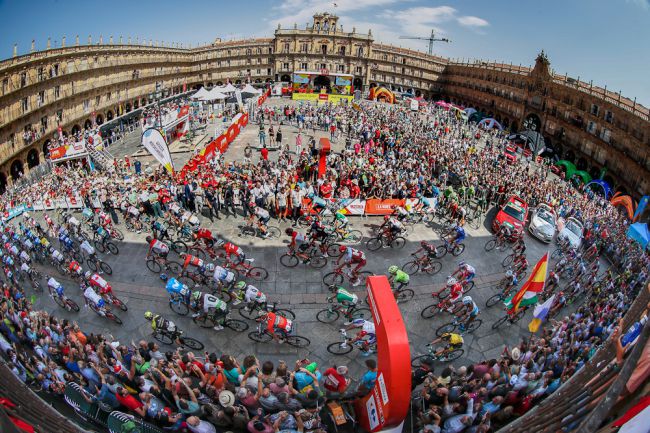Autumn Grand Tours can help create hope, says Vuelta a España boss
Guillén insists health is the top priority in organising November Vuelta

Like so many people right now, Vuelta a España director Javier Guillén is currently playing a waiting game. But within those parameters, the head of cycling’s third Grand Tour is determined that the race will be as prepared as possible for a return when the time finally comes.
"Now the UCI have published their communiqué and the Tour de France dates are set in place, the other races can find their place in the calendar," Guillen tells Cyclingnews.
"But regardless, our biggest concern in the Vuelta organisation is to get through this health crisis. Before races happen, we need to have a society with its own normality restored, and then we can have normality in sport. So health comes first, but we can’t stop working at what we hope will happen once we’ve got through this situation."
Guillén is at pains to point out that the Vuelta a España - and any bike race - would only take place "with all the guarantees for public and rider safety that need to be in place". Rather than taking risks, he would like to see the Vuelta and the other Grand Tours acting as "something that helps create hope".
Grand Tours have had this role in the past, after all - as happened with the 1946 Giro d’Italia after World War II, dubbed the Giro della Rinascita [Giro of Rebirth]. There are also potential parallels with the 1968 Tour de France, which reportedly was told to go ahead by the French state authorities as a way of indicating that, after the turmoil of May that year in the country, normal life went on as usual.
"If this pandemic is teaching us one thing, it’s that we come through this together and thanks to a a joint effort, and a Grand Tour is a an expression of that effort. It's a trademark of the country," said Guillén.
"So I hope and desire that this year, all three Grand Tours can have that role again."
Get The Leadout Newsletter
The latest race content, interviews, features, reviews and expert buying guides, direct to your inbox!
No confirmed dates or start location
However, it’s worth remembering that the coronavirus has taken a particularly severe toll on Spain, and Guillén refuses to be drawn on any specific details in terms of dates for the Vuelta or whether it will or will not start, as was planned, in Holland.
Rather, he argues that the current veil of confidentiality which has been drawn over calendar specifics by the UCI should remain in place for now. The initial idea, though, is that the Vuelta will take place roughly in November, nearly three months later than usual.
"We’re in an exceptional situation and exceptional situations require exceptional responses. If the racing calendar has been cut back at the start of the year, it’s logical to think that it can be extended at the other end," Guillen argues.
"From there on, nobody, starting with the UCI or the organisers, is going to accept definitive dates that would put the cyclists' health at risk."
Guillén also pointed out that "November is not the same in some parts of Europe as it is in others". In Spain, the weather tends to be cold, but compared to north of the Pyrenees, it’s relatively dry, and, he added "it wouldn’t be the same to have a race start on November 1st on November 30th."
Bouncing around the calendar
As for the practicalities of organising a Grand Tour during lockdown, Unipublic is, Guillén says, hampered by the impossibility of travelling, but is fortunate that a lot of preparations had already been done prior to Spain’s lockdown starting on March 14th. The next goal is to have as much place that can be in place, under the circumstances, for when lockdown ends.
Of all three Grand Tours, calendar-wise, the Vuelta a España is by far the best travelled. Having started in late spring in its earliest years in the mid-1930s, it then briefly moved to a mid-summer slot in the 1950s then back to April. But the most controversial change took place in 1995 when it shifted a full five months to September in what was the last major overhaul of the cycling calendar prior to 2020.
But if the Vuelta’s change from spring to autumn - and with it the Worlds moving from August to late September - felt like a major earth tremor in the cycling calendar at the time, it is miniscule in comparison with the reworking of this year’s race dates. On top of that, as Guillén points out, it has brought clear benefits to cycling’s third Grand Tour, despite the initial reservations.
"Changing the Vuelta to September was not that dramatic, it was important, something intelligent and necessary, and, at the end of the day, it favoured us greatly," Guillen says.
Guillén concludes that the Vuelta will be as prepared as possible for whatever finally materialises, which is not a bad place to start, in anyone’s book, and given the current, brutally exceptional circumstances, the most that realistically can be expected.
Alasdair Fotheringham has been reporting on cycling since 1991. He has covered every Tour de France since 1992 bar one, as well as numerous other bike races of all shapes and sizes, ranging from the Olympic Games in 2008 to the now sadly defunct Subida a Urkiola hill climb in Spain. As well as working for Cyclingnews, he has also written for The Independent, The Guardian, ProCycling, The Express and Reuters.
